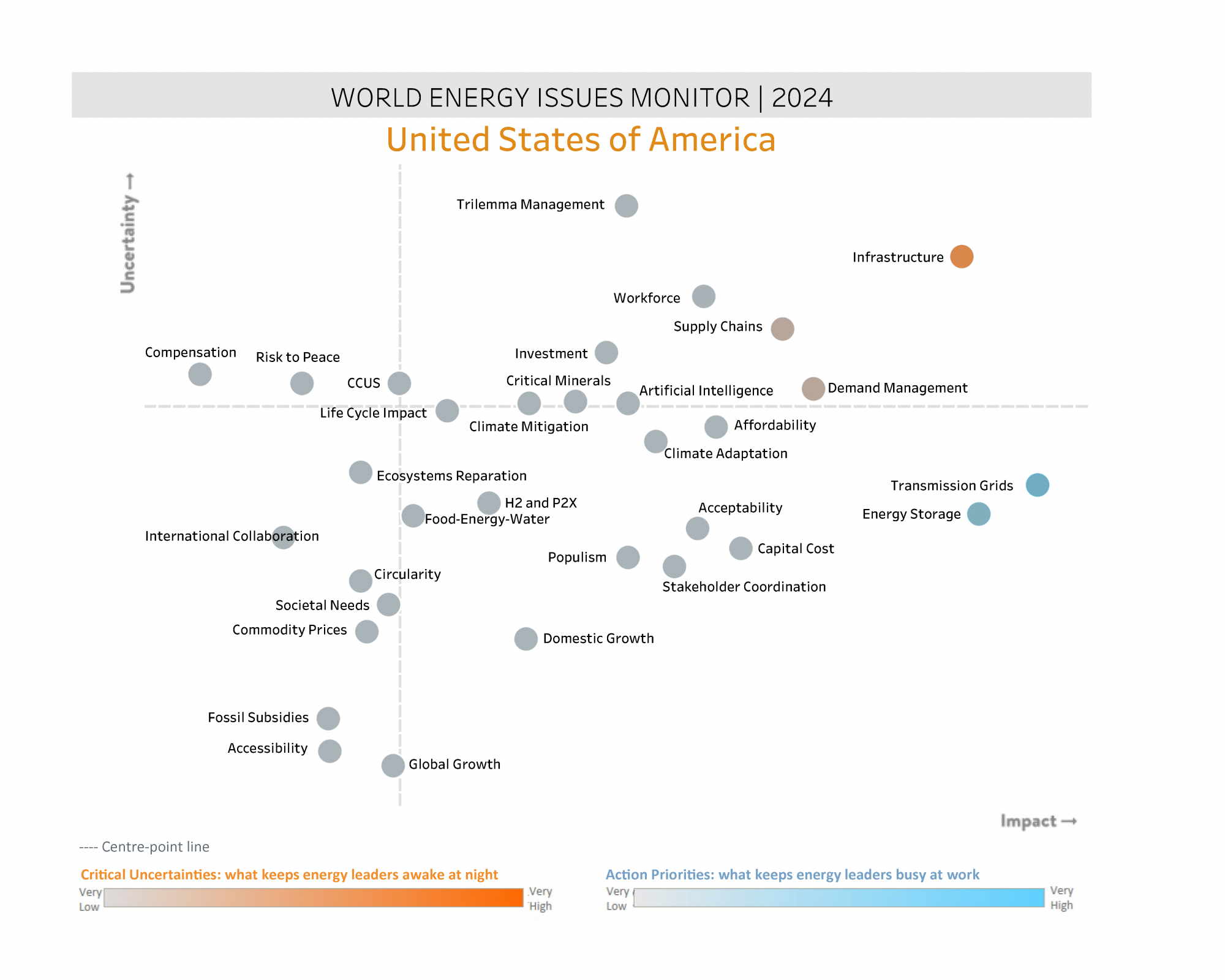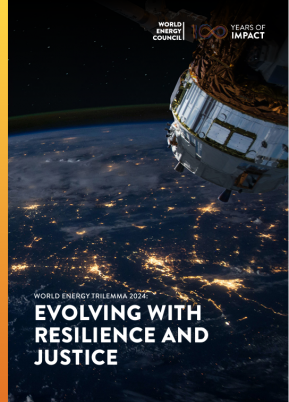The US Member Committee is hosted by the Electric Power Research Institute. The US Member Committee represents innovators, leaders and disruptors in the US energy community, bringing their voices to the global community of the World Energy Council. EPRI drives R&D involving hundreds of leading energy companies from across the US and around the world. The institute’s engagement will lend US and global organizations the benefit of one another’s insights and perspectives at a transformative time for the energy sector. EPRI’s focus on research and data-driven solutions closely aligns with the Council’s approach to equipping its network with practical “how-to” knowledge in managing the energy transition at all scales. The US is a founding member of the World Energy Council in 1923 and has hosted successful editions of the World Energy Congress in 1936, 1974 and 1998, fueling energy conversations amongst global powers.

Neil Wilmshurst is Senior Vice President of Energy System Resources for the Electric Power Research Institute (EPRI). He has overall management and technical responsibility for the research and development activities conducted by EPRI with its global membership related to all generation sources and storage.
Wilmshurst joined EPRI in 2003 as a Senior Project Manager in the Plant Support Engineering program. In 2008, he became Director of the Plant Technology department. He was appointed as Vice President, Nuclear and Chief Nuclear Officer in 2010, where, until 2020, he led the sector through the impactful years following the Fukushima accident. During this time, the nuclear sector's global membership expanded to encompass more than 80% of the world's commercial nuclear fleet.
Before joining EPRI, Wilmshurst worked in various nuclear utility engineering and maintenance roles with AmerGen and Exelon at Three Mile Island Unit 1 and British Energy at Sizewell B. Before joining the civil nuclear program, Wilmshurst served 13 years in the Royal Navy as a Nuclear Submarine Engineer Officer.
Wilmshurst received a bachelor's degree in electrical, mechanical, and control engineering from the Royal Naval Engineering College, Manadon, a Post Graduate Diploma in nuclear reactor technology from the Royal Naval College, Greenwich, and a master's degree in defense administration from Cranfield Institute of Technology, Shrivenham. He was also certified as a Naval Nuclear Plant Operator.

María Guimaraes is a Technical Executive for the International Engagement team in the Nuclear Sector at EPRI. In this role, she manages the U.S. Member Committee of the World Energy Council and coordinates international collaboration projects.
Previously at EPRI, she created a cross-functional technical program to address infrastructure aging and inspection across the electricity sector, from nuclear containment buildings and spent fuel pools to hydroelectric facilities. She has also managed the Real-time Monitoring program in the Nuclear Plant Support group.
Before joining EPRI in 2009, she worked as a project manager in the R&D department of Aalborg Portland, a cement and concrete manufacturing company in Denmark. In that position, she participated in a Nordic Innovation project evaluating CO2 uptake in degraded concrete. She also led projects to develop new cement types with low energy consumption and lower emissions.
She received a Bachelor’s degree in construction engineering from the Universidad Nacional del Nordeste, Argentina; a Master’s degree in civil engineering from the University of Newcastle, UK; and a Doctorate degree in civil and environmental engineering from the Georgia Institute of Technology, USA.
Guimaraes is a Fulbright scholar and is passionate about increasing energy literacy among high school teachers in the U.S. and Nigeria.
Energy in the United States
US responses to the 2024 survey align with global trends conveying increased uncertainty on many key issues, particularly on infrastructure action planning; supply chain disruptions; and adequate policy environment needed to transform energy demand across sectors.
CRITICAL UNCERTAINTIES
The uncertainties identified in the 2024 US Energy Issues Survey closely mirror those of North America. Both highlight significant concerns about whether strategic planning, construction, and upgrades of critical infrastructure can be achieved at the necessary scale to keep pace with the energy transition. This reflects the growing challenges in connecting new generation capacities—interconnection queues now exceed 2500 GW—and managing renewed load growth from data centers, the reshoring of manufacturing, and electrification. Additionally, there are increased demands to enhance the grid's resilience against extreme weather and cyberattacks.
Managing energy demand emerges as a clear necessity, acknowledged as a high-impact issue in the global, North American, and US surveys. In the US, with its rising electricity demand, it is crucial to operate the grid more intelligently rather than merely expanding it to meet peak demands. Flexible charging for electric vehicles and homes presents a significant opportunity in the mid- to long-term. Moreover, increasing temporal and spatial flexibility in sectors like data centers can reduce peak grid loads, better utilize existing assets, and alleviate resource adequacy concerns.
Supply chain disruptions, particularly concerning green technology, pose significant risks to the pace of the energy transition. The US and global surveys indicate uncertainties around potential supply chain issues that could jeopardize 2050 climate goals. Well-documented backlogs in the supply of large and small electrical transformers, persistent shortages in electrical switchgear, HVDC equipment, advanced power generation technologies, and skilled workforce need to be addressed. Secure supply chains for key minerals and materials are only beginning to develop, highlighting a critical area for future focus.
ACTION PRIORITIES
The transmission grid has been identified as a key action priority for advancing energy transitions not only in the United States and North America but also globally. This was effectively highlighted at the 26th World Energy Congress, held in Rotterdam, The Netherlands in April 2024, panel discussing "No Transition without Transmission." While the broad reforms recently passed by the Federal Energy Regulatory Commission (FERC) and actions under the Infrastructure Investment and Jobs Act (IIJA) may facilitate cross-state transmission, forward-looking regional planning, and cost allocation, permitting issues from local to federal levels remain a significant barrier to rapid progress.
The perception of energy storage has evolved considerably, as reflected in the US Energy Issues Survey results from 2022 to 2024. Energy storage has transitioned from being an uncertainty to becoming an action priority. In regions with significant solar PV deployment, battery storage is increasing rapidly to minimize energy loss and shift excess power generation by several hours. Despite initial price increases due to supply chain constraints, battery costs have continued to decline. Additionally, interest in pumped storage hydroelectric generation has risen due to its known cost-effectiveness and feasibility for providing long-term storage.
Climate change management, previously the highest critical uncertainty, has become less uncertain following the passage of the Inflation Reduction Act (IRA). The IRA provides unprecedented incentives for climate adaptation and mitigation investments. Climate adaptation measures include incentives at the grid, community, and household levels. Meanwhile, climate mitigation efforts significantly reduce the cost of clean energy production, encourage new clean energy innovations, and offer direct support to households and businesses aiming to reduce their emissions.
Acknowledgements
U.S. Member Committee

Downloads

US World Energy Trilemma Country Profile 2024
Download PDF
USA Energy Issues Monitor 2024
Download PDF
World Energy Issues Monitor 2024
Download PDF






_-80_result_688_387_s_c1_c_c.jpg)


